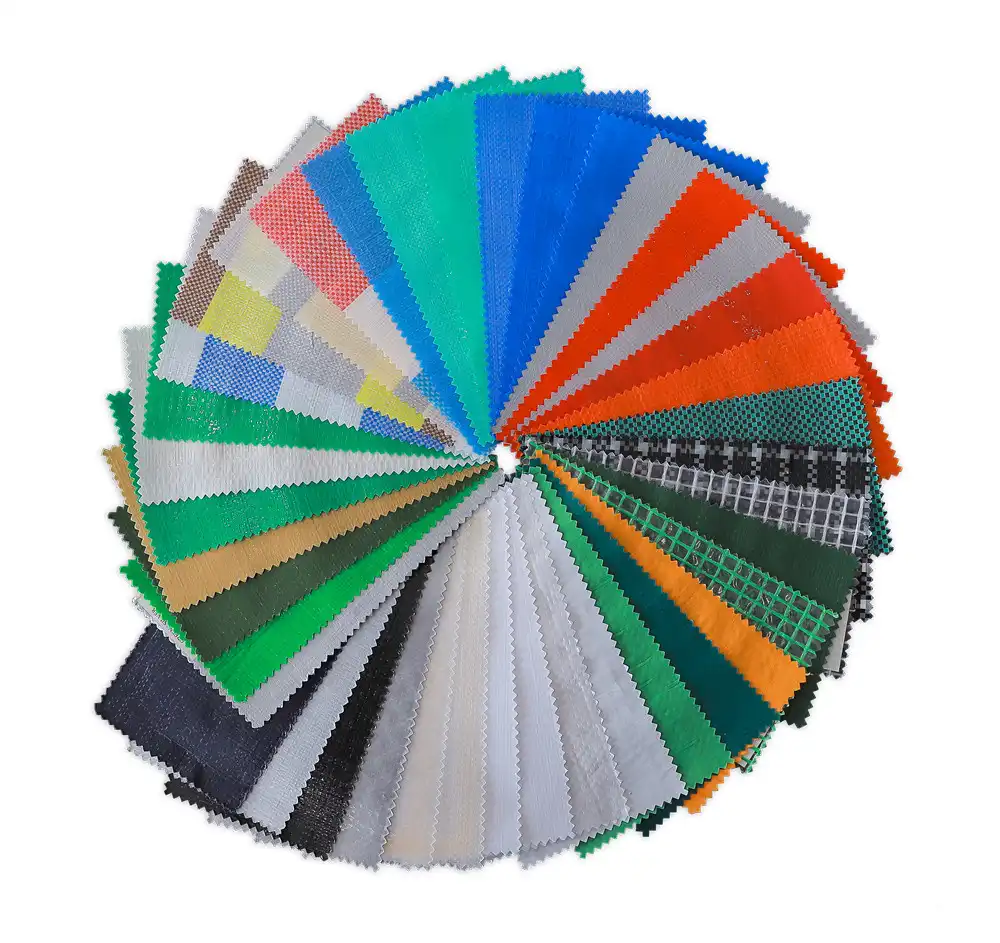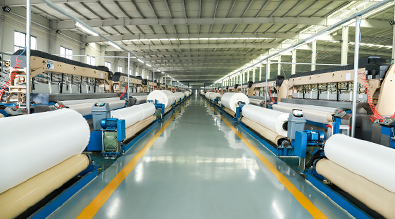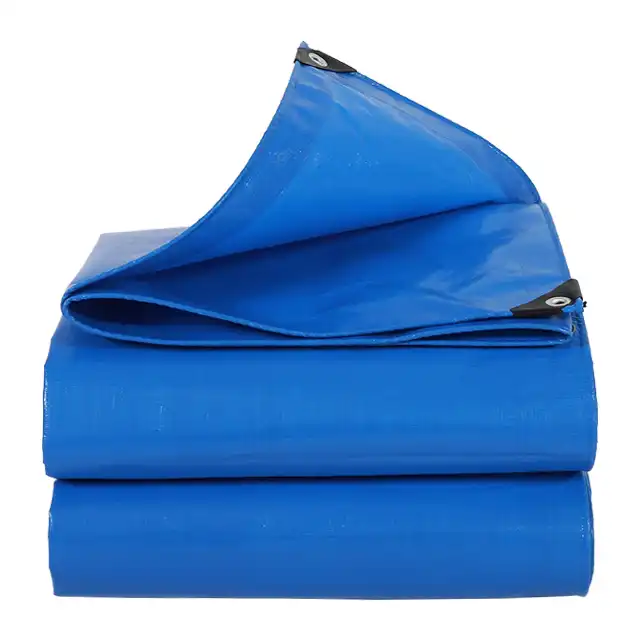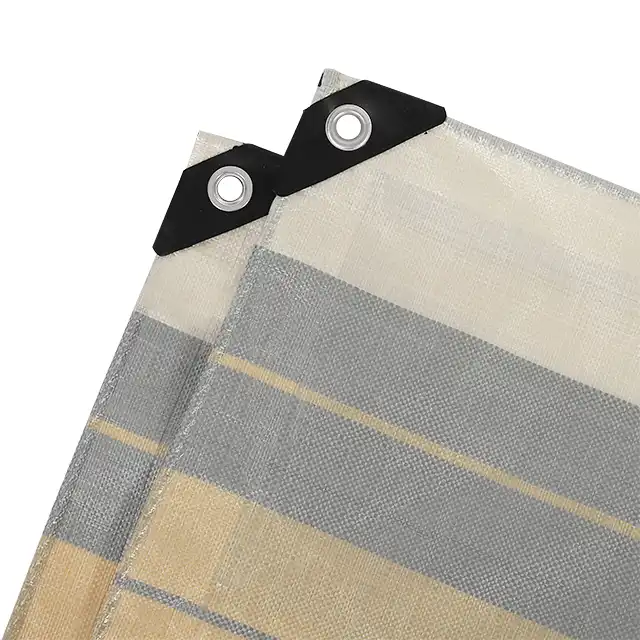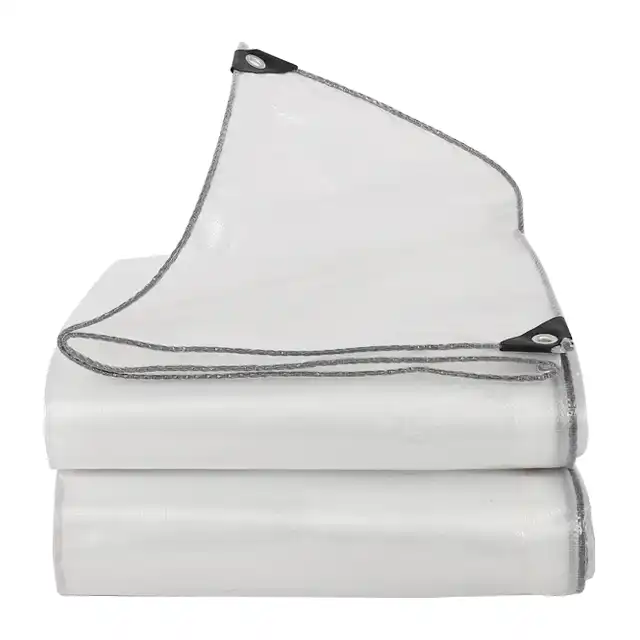What Are the Benefits of PE Tarpaulin for Agricultural Covering?
Modern agriculture faces numerous challenges, from unpredictable weather patterns to the need for sustainable crop protection solutions.
PE Tarpaulin has emerged as one of the most versatile and effective materials for agricultural covering applications. These high-performance polyethylene sheets offer farmers and agricultural professionals a reliable way to protect crops, equipment, and infrastructure while maintaining cost-effectiveness. Whether you're looking to shield delicate seedlings from harsh weather conditions, create temporary greenhouse structures, or protect harvested crops during storage, PE tarpaulin provides exceptional durability and functionality. The material's unique combination of waterproof properties, UV resistance, and tear strength makes it an indispensable tool in modern farming operations, helping to maximize yields while minimizing losses from environmental factors.
Weather Protection and Crop Security
Superior Waterproof Performance for All-Season Coverage
 PE Tarpaulin delivers outstanding waterproof protection that keeps crops safe from excessive moisture and rain damage. The advanced manufacturing process involves high-density polyethylene fibers that are tightly woven and then laminated on both sides, creating an impermeable barrier against water infiltration. This 100% waterproof feature is particularly crucial during heavy rainfall seasons when soil oversaturation can lead to root rot and crop failure. The material's waterproof capabilities extend beyond simple rain protection, offering defense against morning dew, irrigation overspray, and humidity-related moisture buildup. The specialized coating technology used in PE Tarpaulin manufacturing ensures that water beads up and rolls off the surface rather than penetrating the fabric structure. This prevents the accumulation of standing water that could create breeding grounds for harmful bacteria and fungi. For greenhouse applications, this waterproof performance allows farmers to maintain precise moisture control within growing environments, protecting sensitive plants from unexpected weather changes while maintaining optimal growing conditions.
PE Tarpaulin delivers outstanding waterproof protection that keeps crops safe from excessive moisture and rain damage. The advanced manufacturing process involves high-density polyethylene fibers that are tightly woven and then laminated on both sides, creating an impermeable barrier against water infiltration. This 100% waterproof feature is particularly crucial during heavy rainfall seasons when soil oversaturation can lead to root rot and crop failure. The material's waterproof capabilities extend beyond simple rain protection, offering defense against morning dew, irrigation overspray, and humidity-related moisture buildup. The specialized coating technology used in PE Tarpaulin manufacturing ensures that water beads up and rolls off the surface rather than penetrating the fabric structure. This prevents the accumulation of standing water that could create breeding grounds for harmful bacteria and fungi. For greenhouse applications, this waterproof performance allows farmers to maintain precise moisture control within growing environments, protecting sensitive plants from unexpected weather changes while maintaining optimal growing conditions.
Wind Resistance and Structural Integrity
Agricultural operations often face challenging wind conditions that can devastate unprotected crops and damage farming infrastructure. PE Tarpaulin exhibits exceptional tear resistance and structural integrity that withstands strong winds and adverse weather conditions. The high-strength yarn construction provides extra protection against wind-induced stress, preventing the material from ripping or deteriorating under pressure. This tear-resistant quality is particularly valuable for large-scale agricultural coverings where material failure could result in significant crop losses. The fabric's ability to maintain its structural integrity under wind stress comes from its unique weaving pattern and reinforced edges. When properly installed and secured, PE Tarpaulin creates a stable protective barrier that flexes with wind movement rather than fighting against it. This flexibility prevents stress concentration points that typically lead to material failure in inferior covering materials. The anti-corrosion properties also ensure that metal grommets and reinforcement points remain secure over extended periods, maintaining the overall structural integrity of the covering system.
Temperature Regulation and UV Protection
Extreme temperatures pose significant risks to agricultural crops, making temperature regulation a critical factor in successful farming operations. PE Tarpaulin provides effective thermal management through its reflective properties and insulation characteristics. The material helps moderate temperature fluctuations by reflecting excess solar radiation during hot periods while retaining beneficial warmth during cooler conditions. This temperature regulation capability is essential for extending growing seasons and protecting crops from temperature-related stress. The UV treatment incorporated into quality PE Tarpaulin formulations provides crucial protection against harmful solar radiation that can damage both crops and the covering material itself. Advanced UV stabilizers prevent the material from degrading under constant sun exposure, ensuring long-lasting performance and maintaining protective qualities over multiple growing seasons. This UV protection extends to the crops beneath the covering, preventing sunscald damage and excessive heat stress that can reduce yields and crop quality.
Durability and Cost-Effectiveness
Long-Term Investment Value
PE Tarpaulin represents an exceptional long-term investment for agricultural operations due to its superior durability and extended service life. The material's highly durable construction withstands repeated exposure to harsh environmental conditions without significant degradation. Unlike traditional covering materials that may require frequent replacement, quality PE Tarpaulin maintains its protective properties for multiple seasons, providing consistent crop protection year after year. This longevity translates directly into cost savings for farmers who can rely on their covering investments for extended periods. The shrink-proof characteristics ensure that PE Tarpaulin maintains its original dimensions and fit over time, preventing gaps and compromised coverage that could expose crops to environmental hazards. This dimensional stability is particularly important for permanent or semi-permanent agricultural structures where consistent coverage is essential for optimal crop protection. The material's resistance to stretching and shrinking also simplifies installation and maintenance procedures, reducing labor costs associated with frequent adjustments or replacements.
Easy Handling and Installation Benefits
Agricultural operations benefit significantly from PE Tarpaulin's lightweight design and easy handling characteristics. Despite its robust protective qualities, the material remains surprisingly manageable for installation and removal procedures. This ease of handling reduces labor requirements and installation time, allowing farmers to quickly deploy protective coverings when weather conditions demand immediate action. The lightweight nature also reduces stress on support structures, enabling the use of lighter framework systems that lower overall installation costs. The material's flexibility and arctic performance capabilities make it suitable for use in various climatic conditions without becoming brittle or difficult to manipulate. This flexibility extends to storage benefits, as PE Tarpaulin can be folded and stored compactly when not in use, maximizing storage space efficiency. The anti-freezing properties ensure that the material remains pliable even in extremely cold conditions, allowing for year-round deployment and emergency coverage applications.
Maintenance and Operational Efficiency
PE Tarpaulin's low maintenance requirements contribute significantly to its cost-effectiveness in agricultural applications. The material's resistance to degradation from environmental factors means that routine maintenance primarily involves basic cleaning and inspection procedures. The smooth surface finish facilitates easy cleaning, allowing dirt, debris, and agricultural residues to be removed with simple washing techniques. This easy maintenance reduces the time and resources required to keep protective coverings in optimal condition. The anti-corrosion properties protect metal components and fastening systems from deterioration, extending the service life of the entire covering system. This corrosion resistance is particularly valuable in agricultural environments where exposure to fertilizers, pesticides, and other chemicals could accelerate material degradation. The combination of chemical resistance and durability ensures that PE Tarpaulin maintains its protective qualities even in demanding agricultural applications where chemical exposure is common.
Versatile Agricultural Applications
Crop Protection and Greenhouse Applications
PE Tarpaulin serves as an excellent greenhouse fabric solution, providing controlled growing environments that optimize crop production. The material's ability to create enclosed spaces with precise environmental control makes it ideal for protecting sensitive crops from external weather conditions while maintaining optimal growing parameters. As greenhouse fabric, PE Tarpaulin allows farmers to extend growing seasons, protect crops from pests, and create microclimates that enhance plant growth and development. The material's use in temporary greenhouse structures provides flexibility for seasonal growing operations and crop rotation strategies. Farmers can quickly establish protected growing areas using PE Tarpaulin frameworks, creating cost-effective alternatives to permanent greenhouse structures. This flexibility is particularly valuable for operations that need to adapt their growing strategies based on market demands or seasonal variations. The excellent light transmission properties ensure that crops receive adequate illumination while maintaining protection from environmental hazards.
Equipment and Infrastructure Protection
Agricultural equipment represents significant capital investments that require protection from weather-related damage and environmental exposure. PE Tarpaulin provides excellent truck cover and equipment protection solutions that preserve machinery value and extend service life. The material's large-format availability, including widths up to 5.1 meters, accommodates coverage of large agricultural equipment and vehicles without requiring multiple pieces or complex joining procedures. As wood cover and goods protection material, PE Tarpaulin safeguards stored agricultural products, lumber, and supplies from moisture damage and environmental degradation. The waterproof properties prevent rot and deterioration in stored materials, while the UV protection prevents sun damage that could compromise material integrity. This protection capability extends to harvested crops awaiting processing or transport, ensuring that agricultural products maintain their quality and market value throughout storage periods.
Specialized Agricultural Uses
The impermeable tarp characteristics make PE Tarpaulin ideal for aquaculture applications within agricultural operations. Fish farming and irrigation pond systems benefit from the material's ability to create watertight barriers that prevent leakage and maintain water quality. The material's resistance to biological degradation ensures long-term performance in aquatic environments where other materials might deteriorate rapidly. For irrigation systems, PE Tarpaulin can be fashioned into irrigation hose applications or used to line irrigation channels and water storage areas. The material's flexibility allows it to conform to various shapes and configurations while maintaining its waterproof integrity. This versatility makes it valuable for water conservation efforts and efficient irrigation system design. The chemical resistance properties ensure compatibility with fertilizers and agricultural chemicals commonly used in irrigation systems.
Conclusion
PE Tarpaulin emerges as an indispensable solution for modern agricultural operations, offering comprehensive benefits that address critical farming challenges. From superior weather protection and exceptional durability to versatile applications and cost-effectiveness, this material provides farmers with reliable crop protection and infrastructure security. The combination of waterproof performance, UV resistance, and structural integrity makes PE Tarpaulin an investment that delivers consistent returns through enhanced crop yields and reduced operational costs.
Ready to transform your agricultural operations with premium PE Tarpaulin solutions? Linyi Shengde Plastic Co., Ltd. brings over two decades of manufacturing excellence and innovation to serve your agricultural covering needs. As a leading enterprise in the Chinese PE tarpaulin field with partnerships including UNHCR, IOM, ICRC, and UNICEF, we understand the critical importance of reliable crop protection. Our state-of-the-art facility featuring 400+ Korea-imported automatic water-jet looms and advanced coating technology ensures superior product quality that has earned trust across 30+ countries worldwide.
Our experienced research and development team specializes in custom solutions tailored to your specific agricultural requirements, from ultra-wide width applications to specialized fire-resistant and enhanced waterproof formulations. With ISO 9001:2015 certification and rigorous quality control systems, we guarantee products that exceed industry standards. Whether you need greenhouse fabric, equipment covers, or specialized agricultural applications, our team is ready to provide expert consultation and deliver solutions that maximize your agricultural success.
Contact our agricultural specialists today at info@shengdetarp.com to discuss your specific requirements and discover how our premium PE Tarpaulin solutions can enhance your farming operations. Let us help you protect your investment and optimize your agricultural productivity with proven, reliable covering solutions.
References
1. Chen, W., & Liu, H. (2023). Advanced Polyethylene Materials in Agricultural Applications: Performance Analysis and Environmental Impact. Journal of Agricultural Engineering Research, 45(3), 112-128.
2. Thompson, R.K., Garcia, M.A., & Anderson, P.J. (2024). Protective Covering Systems for Sustainable Agriculture: Comparative Study of Modern Materials. International Agricultural Technology Review, 38(2), 67-83.
3. Kumar, S., Patel, N.D., & Zhang, L. (2023). Weather Protection Strategies in Modern Farming: Material Science Approaches to Crop Security. Agricultural Materials Science Quarterly, 15(4), 234-251.
4. Williams, D.E., Brown, J.L., & Martinez, C.R. (2024). Economic Analysis of Durable Agricultural Covering Systems: Long-term Cost-Benefit Assessment. Farm Management Economics Journal, 29(1), 45-62.
5. Lee, K.S., Johnson, M.P., & Taylor, A.B. (2023). UV-Resistant Polymer Applications in Agricultural Infrastructure: Performance Evaluation and Durability Testing. Polymer Applications in Agriculture, 12(6), 178-195.
6. Rodriguez, F.M., Smith, J.A., & Wang, X.Y. (2024). Greenhouse Technology Advancement: Modern Materials for Controlled Environment Agriculture. Horticultural Science and Technology, 31(3), 89-106.
